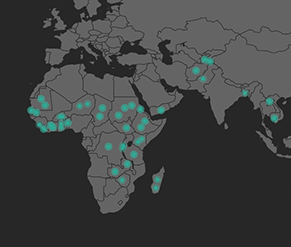In 2009, the Government of the Democratic Republic of Congo (DRC) developed a policy for the use of national languages (Stratégie nationale d’utilisation des langues nationales), which prescribes that, for grades 1 through 4, a national language will be the language of instruction, in addition to being a stand-alone subject.
The policy states that no single language will apply across the country, but rather each of the four national languages (Lingala, Kiswahili, Chiluba, Kikongo) will be used in the geographic area where it is most commonly spoken. The policy just started being piloted across the country, with an emphasis on early grades. It is progressively rolled out throughout the country with a strong support from various partners and GPE.
A new policy to promote national languages
The policy for language of instruction, developed by the Ministry of Primary, Secondary Education and Initiation to Citizenship, includes the following:
- From grades 1 to 4, one of the four designated national languages is a stand-alone subject and the language of instruction. French is a subject.
- Grades 3 and 4 are considered transition years, where French will be used more as the oral language of instruction in the classroom.
- In grades 5 and 6, French is both a subject and the primary language of instruction. The national languages remain as a subject.


